January 21, 2025 · 19 min read
Optimizing Research Project Management with AI-Based Meeting Tools

Shaimaa Badawi
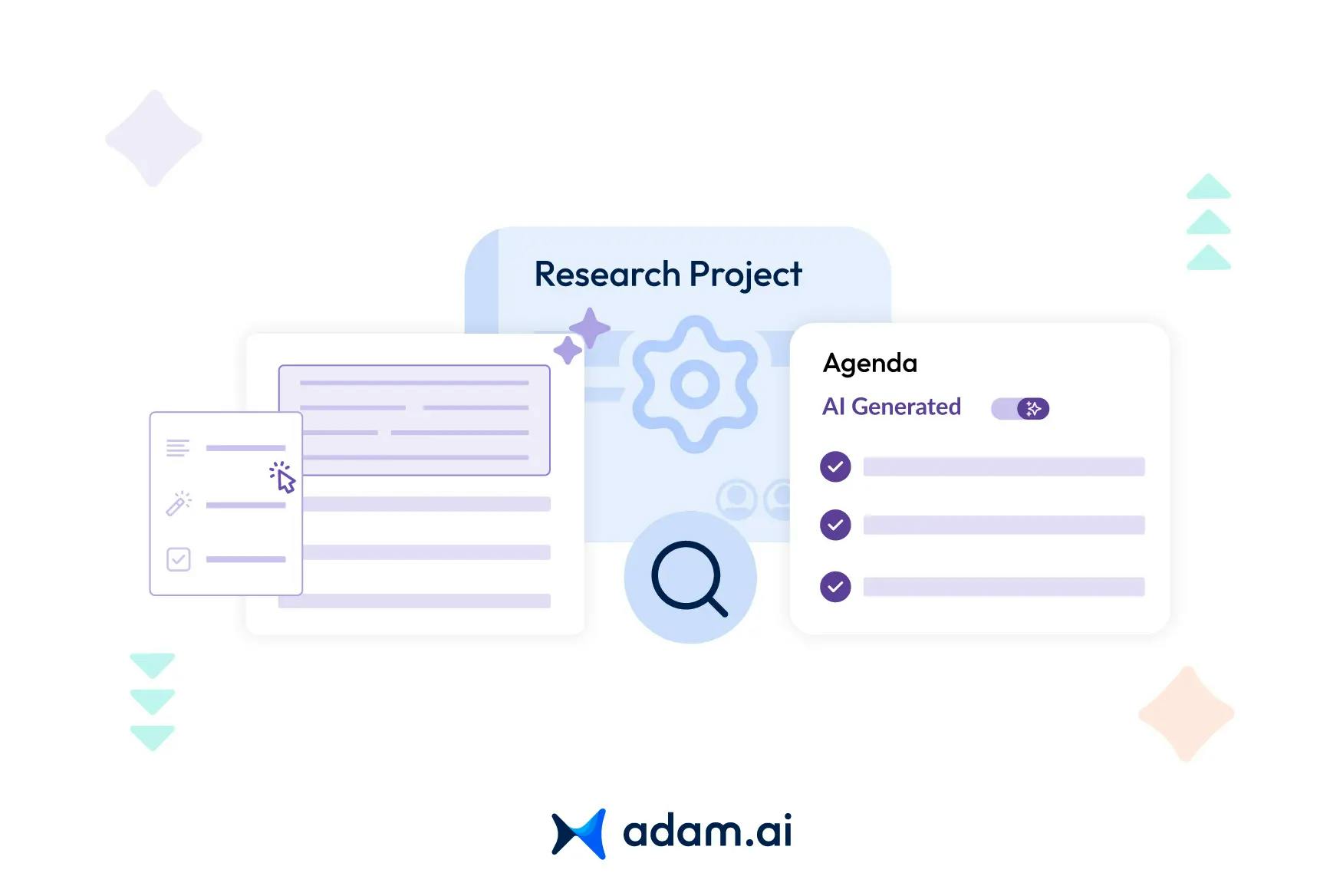
Research thrives on collaboration, but managing meetings, tracking discussions, and ensuring follow-through can quickly become a logistical headache. Critical decisions get buried in endless emails, meeting notes pile up without clear action, and project momentum slows. When time and funding are limited, inefficiencies like these can hold back groundbreaking discoveries. This article explores how AI-driven tools enhance research collaboration, improve knowledge retention, and keep projects on track with smarter meeting management.
What are the biggest challenges in managing research projects today?
Managing a research project isn’t like managing a standard business initiative. It’s unpredictable, often resource-constrained, and involves juggling multiple stakeholders while keeping up with compliance and documentation. If you’ve ever felt like you’re constantly fighting fires rather than making progress, you’re not alone. Here are the biggest challenges research project managers face today and what can be done about them.
1. Research scope is always changing
Research doesn’t follow a straight path. Hypotheses evolve, experiments fail, and findings lead to unexpected directions. Unlike commercial projects with well-defined deliverables, research requires flexibility. But constant changes can throw off timelines, making it hard to set clear milestones or predict resource needs.
What you can do:
- Use adaptive project planning tools: AI-based management solutions help adjust plans dynamically based on new inputs.
- Set flexible milestones: Instead of rigid deadlines, define checkpoints based on research phases rather than specific outcomes.
2. Collaboration across institutions is complex
Most research projects involve multiple universities, government agencies, and industry partners. Each entity has its own tools, workflows, and approval processes. Communication delays, data-sharing restrictions, and conflicting priorities can slow down progress.
What you can do:
- Standardize meeting structures: AI-powered meeting platforms can streamline collaboration by ensuring structured discussions, automated follow-ups, and centralized access to notes.
- Leverage secure, cloud-based collaboration tools: Platforms that offer access control and compliance-friendly file-sharing prevent information silos. Following best practices for cross-functional projects ensures smoother collaboration among research teams, institutions, and funding agencies.
3. Meetings waste too much time
Without structured agendas and action tracking, key decisions get lost in back-and-forth emails, delaying progress. Long, unstructured discussions can drain productivity and engagement, but reducing meeting fatigue with AI ensures that meetings remain focused, efficient, and necessary.
What you can do:
- Automate meeting summaries: AI-driven tools can transcribe discussions, highlight action points, and ensure accountability. AI-generated smarter meeting agendas prioritize key discussion points, reducing wasted time and improving overall meeting effectiveness.
- Keep discussions focused: Set clear objectives for each meeting, allocate specific times for each topic, and use structured decision-making formats. Streamlining discussions not only saves time but also enhances productivity, contributing to the ROI of reduced meeting time by allowing teams to focus on actual research.
4. Funding is unpredictable and hard to manage
Grants don’t always cover everything, and budget constraints can derail projects. Misallocated funds, delays in approvals, and unexpected costs create major roadblocks.
What you can do:
- Use AI-powered forecasting: AI tools analyze spending trends and help predict when funding gaps might arise.
- Track spending in real time: Digital platforms allow researchers to allocate resources more effectively and avoid last-minute budget shortfalls.
5. Compliance and ethical regulations add layers of complexity
Between IRB approvals, data privacy laws, and funding requirements, research teams must navigate an ever-growing list of regulations. Failure to comply can result in project delays or loss of funding.
What you can do:
- Automate compliance tracking: AI-based tools can flag missing approvals, track regulatory changes, and provide reminders before deadlines.
- Centralize documentation: A single source of truth for approvals, consent forms, and ethical reviews ensures everything is accessible and up to date.
6. Administrative tasks take over research time
Researchers spend too much time on documentation, grant reporting, and scheduling instead of focusing on actual research. Manually handling these tasks slows progress and leads to errors.
What you can do:
- Automate workflows: AI-based management platforms handle routine tasks like scheduling, follow-ups, and report generation. With AI-powered meeting tools, research teams can automate repetitive administrative tasks, focus on collaboration, and ensure every decision is well-documented.
- Streamline data entry: Use voice-to-text or AI transcription tools to document research updates efficiently.
7. Knowledge retention is a challenge
When a research team member leaves, valuable knowledge often goes with them. Inconsistent documentation, scattered notes, and missing context make it difficult for new team members to pick up where others left off.
What you can do:
- Use AI-powered knowledge management: Smart systems automatically tag, organize, and retrieve key information when needed.
- Standardize project documentation: Keeping a structured archive ensures that findings, methodologies, and notes remain accessible over time.
8. Adopting new technologies is a struggle
AI and automation tools are transforming research project management, but many institutions resist change. Outdated systems, lack of training, and fear of job displacement slow down adoption.
What you can do:
- Prioritize user-friendly tools: Choose AI-powered meeting and project management platforms with intuitive interfaces.
- Offer training and incentives: Help research teams transition to new systems by demonstrating how they reduce workload and improve efficiency. AI-powered tools enhance coordination among remote project teams, reducing communication gaps and ensuring consistent progress tracking.
9. Risk management is often reactive instead of proactive
Research projects come with many uncertainties, such as unexpected experimental failures, delays in peer reviews, or sudden regulatory shifts. Without proactive risk assessment, teams are left scrambling when things go wrong.
What you can do:
- Implement predictive analytics: AI can assess historical data to predict potential risks before they escalate.
- Develop contingency plans: Creating backup strategies ensures projects stay on track despite setbacks.
10. The pressure to publish slows down quality research
Deadlines for publishing results and securing future grants create immense pressure on researchers. In some cases, this leads to rushed analysis, overlooked errors, or conflicts over authorship.
What you can do:
- Use AI-assisted data analysis: AI tools help process large datasets quickly, reducing errors and improving insights.
- Optimize the peer review process: AI can flag inconsistencies and suggest improvements before submission, increasing the chances of acceptance.
How can AI-driven tools improve research project planning and execution?
Research projects are complex by nature; unpredictable timelines, evolving objectives, and multiple stakeholders make planning and execution a challenge. AI-driven tools bring structure, efficiency, and adaptability to research management, allowing teams to focus more on innovation and less on administrative burdens. Here’s how AI is reshaping research project management.
1. Intelligent project planning: AI adapts as research evolves
Unlike traditional project management methods, AI doesn’t just follow a set plan; it adapts in real time. Research projects often change direction based on findings, funding shifts, or new regulations. AI helps manage these uncertainties by analyzing historical data and adjusting timelines, budgets, and resource allocations accordingly.
What AI can do:
✔ Predict and adjust schedules based on past research cycles, deadlines, and dependencies.
✔ Automate task allocation by assessing workload distribution and researcher availability.
✔ Identify potential bottlenecks before they cause delays.
2. Enhanced collaboration across teams and institutions
Research often involves multiple collaborators across universities, industries, and even different time zones. Miscommunication, scattered documentation, and inconsistent workflows slow down progress. AI-powered collaboration tools ensure that everyone stays aligned.
What AI can do:
✔ Provide a centralized hub for meeting notes, discussions, and research documentation.
✔ Facilitate real-time updates so all team members have access to the latest project changes.
✔ Automate notifications and reminders to ensure deadlines aren’t missed.
AI-driven platforms enable real-time collaboration in project meetings, ensuring that every participant remains aligned on key decisions and project updates.
3. Smarter meeting management for faster decision-making
Meetings are essential in research, but they often take up too much time and lead to unstructured discussions. AI-powered meeting tools streamline the process by keeping conversations focused and ensuring that action items don’t get lost.
What AI can do:
✔ Generate structured agendas based on past meeting discussions and project needs.
✔ Transcribe meetings in real-time and highlight key decisions automatically.
✔ Assign action items and track their progress, reducing the need for follow-up emails.
By leveraging machine learning in meeting preparation, research teams can ensure that discussions are well-informed, agenda-driven, and free from redundant topics.
4. AI-powered risk assessment and problem-solving
Research projects have their hurdles; experiments fail, funding gets delayed, and unexpected technical challenges arise. AI tools help teams anticipate and mitigate risks before they become critical issues.
What AI can do:
✔ Analyze past research failures to predict potential risks in current projects.
✔ Monitor real-time project data to detect anomalies and suggest corrective actions.
✔ Recommend alternative strategies based on similar projects and outcomes.
5. Automated data management and knowledge retention
Research projects generate massive amounts of data, like papers, meeting notes, experimental results, and regulatory documents. AI simplifies data management, ensuring that critical knowledge isn’t lost over time.
What AI can do:
✔ Categorize and tag research materials for easy retrieval.
✔ Ensure version control by automatically tracking changes in documents.
✔ Help new team members onboard faster by summarizing key findings from previous work.
6. AI-driven insights for better decision-making
Research leaders often rely on intuition when making strategic decisions. AI enhances this process by providing data-backed insights, allowing for more informed choices.
What AI can do:
✔ Analyze patterns in research progress to determine what’s working and what’s not.
✔ Suggest resource reallocations based on team performance and project needs.
✔ Track publication trends and funding opportunities to align research with high-impact areas.
Research teams can drive better decision-making by using project meeting data for strategy, identifying trends and optimizing workflows based on AI-driven insights.
How does AI enhance collaboration and decision-making in research teams?
Collaboration and decision-making are at the heart of successful research projects, but they often suffer from miscommunication, scattered documentation, and slow response times. AI-driven tools help research teams work more effectively by streamlining communication, automating repetitive tasks, and ensuring data-driven decision-making. Here’s how AI is transforming collaboration in research.
1. Centralized communication and real-time updates
Research teams often rely on email threads, fragmented chat applications, and inconsistent updates, leading to misalignment and lost information. AI-powered collaboration platforms keep all project communications in one place, ensuring that team members always have access to the latest updates.
What AI can do:
✔ Automate project updates by summarizing key discussions and decisions from meetings.
✔ Track and organize conversations to ensure critical insights are easily retrievable.
✔ Provide smart notifications so researchers get timely reminders about deadlines and action items.
A centralized platform for meeting documentation ensures that research teams never lose track of critical discussions, decisions, or follow-ups.
2. AI-powered meeting management for faster decision-making
Meetings are necessary for research coordination, but they often become inefficient, with lengthy discussions and no clear takeaways. AI-driven meeting tools improve structure and accountability.
What AI can do:
✔ Generate structured agendas based on previous meetings and project priorities.
✔ Transcribe and summarize meetings in real-time to capture key insights and decisions.
✔ Assign action items automatically and track their completion, reducing the need for follow-ups.
Integrating AI in meeting management allows research teams to improve coordination, reduce repetitive discussions, and ensure that every meeting leads to actionable outcomes.
3. Intelligent task delegation and workflow automation
One of the biggest challenges in research teams is assigning tasks effectively. AI can analyze team members’ workloads, expertise, and project timelines to suggest optimized task assignments.
What AI can do:
✔ Balance workloads intelligently to ensure fair distribution of responsibilities.
✔ Automate routine administrative tasks, such as scheduling and report generation.
✔ Identify project bottlenecks and recommend adjustments before they impact progress.
4. AI-powered decision support with predictive analytics
Research leaders often rely on intuition and past experience when making strategic decisions. AI enhances this process by providing data-driven insights and highlighting trends that might be overlooked.
What AI can do:
✔ Analyze historical research data to predict potential roadblocks or inefficiencies.
✔ Assess risk factors and suggest alternative strategies to improve project success rates.
✔ Identify research gaps and opportunities by analyzing related studies and industry trends.
AI plays a key role in streamlining project communication, ensuring that messages, updates, and meeting insights are automatically organized and accessible.
5. Breaking down barriers in global and cross-disciplinary research
Collaboration often spans different institutions, disciplines, and time zones, which can slow down communication and decision-making. AI helps bridge these gaps by facilitating seamless collaboration.
What AI can do:
✔ Provide real-time language translation for international teams.
✔ Enable asynchronous collaboration with AI-generated meeting summaries and reports.
✔ Ensure seamless document sharing and access control for research teams across institutions.
How can AI improve research knowledge management?
Research projects generate an overwhelming amount of information, like datasets, reports, meeting notes, regulatory documents, and literature reviews. Without an efficient way to organize and retrieve this knowledge, teams waste time searching for critical details or risk losing valuable insights. AI-driven tools streamline knowledge management by automating documentation, enhancing accessibility, and ensuring research findings don’t get buried or forgotten.
1. Capturing and structuring research data automatically
Instead of manually sorting through files and notes, AI helps researchers organize information as it’s created. Advanced algorithms can extract key points from research papers, categorize findings, and tag documents based on relevance. This means researchers spend less time organizing and more time analyzing.
How AI helps:
✔ Extracts key insights from lengthy documents, summarizing essential information.
✔ Automatically categorizes research materials, making them easier to find later.
✔ Uses smart tagging and metadata to improve document retrieval.
2. Keeping meeting insights and decisions accessible
Important decisions often get lost in email threads or scattered meeting notes. AI-driven meeting management tools ensure that every discussion is recorded, summarized, and linked to relevant project tasks, so key takeaways are always within reach.
How AI helps:
✔ Generates meeting summaries automatically, highlighting action items.
✔ Links discussions to research projects, so insights aren’t disconnected from workflows.
✔ Tracks follow-ups and deadlines, reducing the risk of forgotten commitments.
AI simplifies tracking action items in project meetings, preventing critical follow-ups from slipping through the cracks.
3. Improving search and retrieval of research knowledge
When a project spans years, or involves multiple collaborators, finding past research can feel like searching for a needle in a haystack. AI-powered search engines simplify this by using natural language processing (NLP) to understand context, not just keywords.
How AI helps:
✔ Delivers context-aware search results, retrieving documents based on meaning, not just words.
✔ Recognizes relationships between research topics, surfacing relevant past work.
✔ Suggests related studies or references, helping researchers connect the dots.
4. Preventing knowledge loss in research teams
When a researcher leaves, their expertise often leaves with them. AI-driven knowledge management tools act as a safeguard, capturing institutional knowledge and making it available for future team members.
How AI helps:
✔ Preserves institutional memory by organizing research histories.
✔ Creates detailed documentation of methodologies, ensuring continuity in long-term projects.
✔ Supports onboarding of new team members with easy access to past insights.
How does AI improve research project coordination and risk management?
Managing a research project means dealing with shifting timelines, unforeseen obstacles, and resource constraints. A single delay can create a chain reaction, throwing off entire workflows. AI-driven tools step in by making project coordination more adaptive, helping teams detect issues early and adjust strategies in real time. Here's how:
1. Keeping research on schedule without constant adjustments
Traditional project planning assumes tasks will progress in a straight line, but research rarely follows a predictable path. Unexpected setbacks, like delayed approvals or extended experiments, can disrupt the entire timeline. AI-powered scheduling tools recognize patterns, predict bottlenecks, and adjust plans dynamically so that deadlines remain achievable.
How AI helps:
✔ Recognizes workload imbalances and adjusts assignments accordingly.
✔ Flags potential delays before they happen, giving teams time to react.
✔ Reschedules dependent tasks automatically to keep projects moving.
2. Tracking progress without chasing status updates
Constantly checking in on task completion wastes time. AI streamlines this by gathering project data in the background and providing real-time visibility into what’s done, what’s in progress, and what’s at risk. Instead of relying on manual updates, project managers can see trends as they unfold.
How AI helps:
✔ Aggregates data from multiple sources to provide a live project overview.
✔ Highlights deviations from the plan so adjustments can be made quickly.
✔ Automates reporting, reducing time spent on administrative updates.
3. Anticipating risks instead of reacting to problems
Every research project involves uncertainty. A delay in funding, an unexpected technical hurdle, or a compliance issue can derail progress. AI minimizes surprises by analyzing project history and external variables to identify risks before they escalate.
How AI helps:
✔ Finds patterns in past research challenges and applies them to current projects.
✔ Evaluates financial and operational risks, offering data-backed solutions.
✔ Alerts teams to early warning signs, preventing last-minute disruptions.
4. Maximizing resources without overloading teams
A research team working at full capacity one month might find itself underutilized the next. AI optimizes resource allocation by assessing workload distribution and forecasting needs, ensuring no one is overwhelmed or underutilized.
How AI helps:
✔ Balances personnel assignments to prevent bottlenecks and burnout.
✔ Optimizes lab and equipment usage to minimize downtime.
✔ Adapts budgets dynamically, reducing unnecessary expenses.
How can AI-driven tools optimize research funding and project outcomes?
Securing research funding is only half the battle. Managing it effectively, by allocating resources, tracking expenditures, and demonstrating impact, is where many projects struggle. Poor financial planning can lead to overspending, resource shortages, or missed opportunities to extend funding. AI-driven tools help researchers optimize budgets, improve grant management, and maximize the impact of their work.
1. Smarter budgeting and financial planning
Funding is often distributed across multiple teams, equipment purchases, and operational costs. Tracking every expense manually is inefficient, and a miscalculation can leave projects underfunded. AI analyzes financial patterns, predicts future expenses, and suggests adjustments before funding runs out.
How AI helps:
✔ Forecasts financial needs based on past spending trends.
✔ Detects inefficiencies in budget allocations and recommends cost-saving measures.
✔ Automates expense tracking, reducing administrative work.
2. Maximizing grant utilization and compliance
Research grants come with strict reporting requirements. Failing to allocate funds correctly or missing reporting deadlines can jeopardize future funding. AI simplifies compliance by organizing financial records, tracking fund usage, and ensuring every dollar is accounted for.
How AI helps:
✔ Monitors grant spending in real time, flagging potential misallocations.
✔ Automatically generates financial reports, making compliance easier.
✔ Alerts teams to upcoming deadlines, ensuring timely grant renewals.
3. Optimizing resource allocation for better outcomes
A well-funded project can still underperform if resources aren’t allocated efficiently. AI ensures that funding is directed where it’s needed most, whether that’s hiring additional researchers, purchasing better equipment, or reallocating funds to high-impact areas.
How AI helps:
✔ Analyzes project performance to determine the best use of funds.
✔ Optimizes staffing decisions, ensuring workloads are balanced.
✔ Improves procurement planning, preventing delays caused by supply shortages.
4. Enhancing research impact with AI-driven insights
Beyond financial management, AI helps researchers maximize the impact of their work. By analyzing data from past projects, AI can identify what strategies led to successful outcomes and apply those insights to current research.
How AI helps:
✔ Identifies trends in successful research projects, guiding decision-making.
✔ Suggests high-impact publishing opportunities, improving visibility.
✔ Assesses project milestones, ensuring research stays aligned with funding goals.
What are the ethical considerations when using AI for research project management?
As with any powerful technology, the use of AI comes with ethical concerns. If not carefully managed, AI can introduce biases, compromise data privacy, or make decisions that lack human oversight. Researchers must balance the efficiency AI offers with responsible implementation. Here are the top things to consider:
1. Ensuring transparency in AI decision-making
One of the biggest concerns with AI-driven project management is the "black box" effect, where AI makes recommendations, but users don’t fully understand how those conclusions were reached. If researchers rely on AI for scheduling, budgeting, or risk assessments, they must ensure the system’s decision-making process is clear and explainable.
What to consider:
- Use AI systems with transparent algorithms, so teams understand how conclusions are made.
- Regularly audit AI-generated recommendations to ensure they align with research goals.
- Maintain human oversight, especially for critical decisions like funding allocation and compliance.
2. Avoiding bias in AI-driven research management
AI models are only as fair as the data they’re trained on. If an AI system is trained on biased data, such as past funding distributions that favored certain institutions or disciplines, it may reinforce those biases in project management decisions.
What to consider:
- Ensure diverse and representative data is used in AI training to prevent systemic biases.
- Monitor AI-driven recommendations for signs of unfair resource allocation.
- Provide a mechanism for human intervention, allowing teams to override AI-driven suggestions when needed.
3. Protecting research data privacy and security
AI-driven research management platforms handle sensitive data—grant proposals, unpublished findings, meeting discussions, and institutional records. Without strict security measures, AI systems could expose this information to unauthorized parties.
What to consider:
- Implement strong encryption for AI-managed research documents.
- Ensure compliance with data protection laws like GDPR or HIPAA when handling personal or proprietary information.
- Limit AI access to sensitive data, ensuring only necessary information is processed.
4. Balancing efficiency with ethical human oversight
AI can optimize scheduling, automate workflows, and track progress, but it shouldn’t replace human judgment in research management. Over-reliance on AI can lead to rigid decision-making that doesn’t account for nuance or ethical concerns.
What to consider:
- Use AI as a support tool, not as a decision-maker for ethical or strategic choices.
- Establish ethical guidelines for AI use in research project management.
- Ensure accountability, so AI-driven decisions can be traced back to responsible individuals.
How does adam.ai empower research teams with AI-driven meeting management?
Managing research projects means juggling multiple discussions, tracking progress across different teams, and ensuring that key decisions don’t get lost. But with scattered emails, unstructured meetings, and manual follow-ups, researchers often spend more time organizing than innovating. That’s where adam.ai comes in:
1. Turn meetings into actionable insights
Many research meetings generate valuable discussions, but without proper documentation, those insights can get lost. adam.ai ensures that every meeting has a clear structure, captures key takeaways, and links discussions to real project tasks.
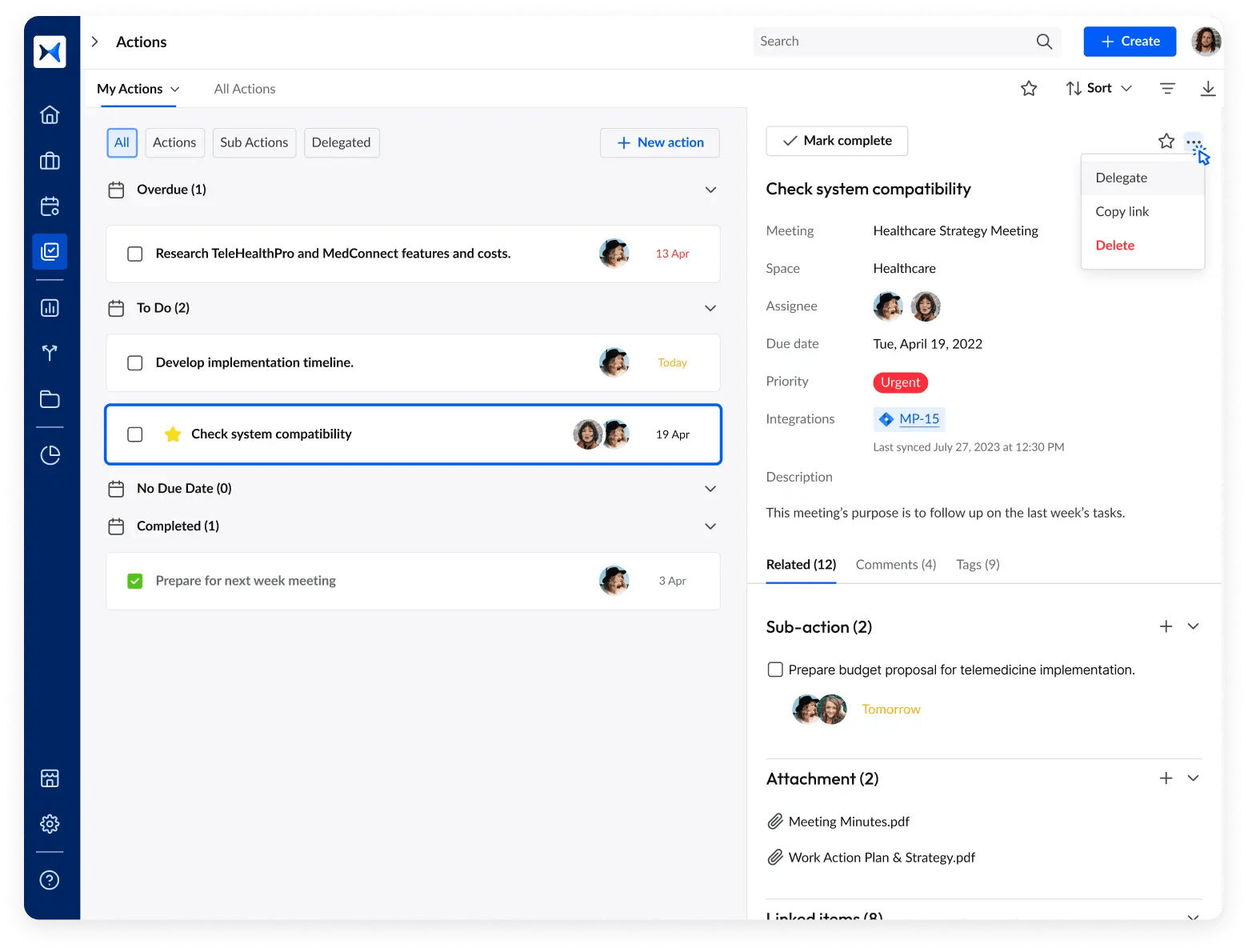
How adam.ai helps:
✔ Automatically records and summarizes meetings, eliminating the need for manual note-taking.
✔ Highlights key decisions and action items, so teams know exactly what to do next.
✔ Links meeting discussions to relevant documents and research tasks, making it easy to track follow-ups.
2. Reduce meeting overload with smart automation
Endless status meetings slow down research progress. adam.ai helps reduce unnecessary meetings by automating follow-ups and ensuring teams only meet when needed.
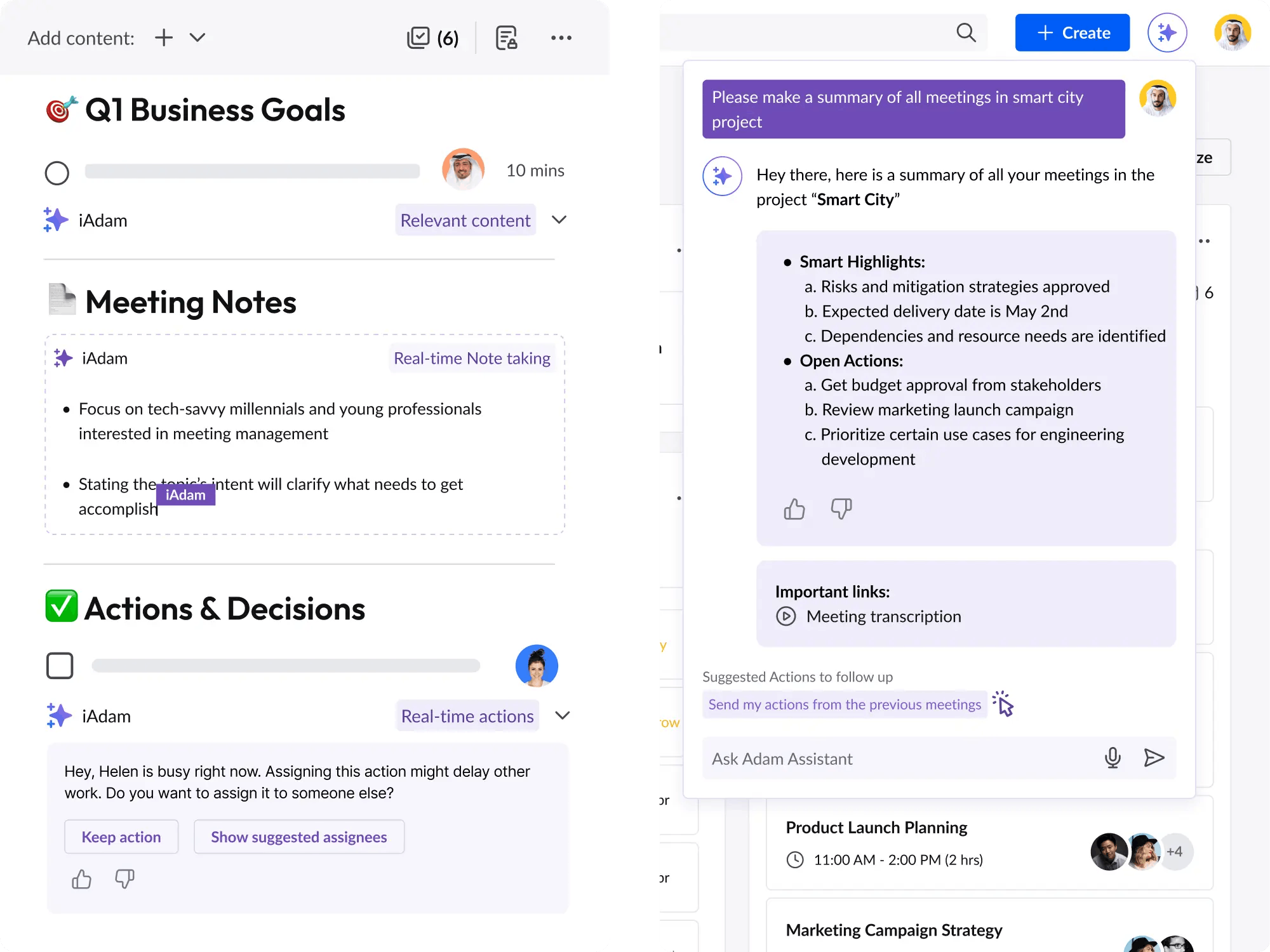
How adam.ai helps:
✔ Automates reminders for pending tasks, reducing the need for constant check-ins.
✔ Tracks meeting attendance and participation, keeping team engagement visible.
✔ Provides AI-driven recommendations for when a meeting is necessary and when an update will suffice.
3. Enhance collaboration across research institutions
Research projects often involve multiple institutions, remote teams, and interdisciplinary collaboration. Keeping everyone aligned across time zones and organizations is a challenge.
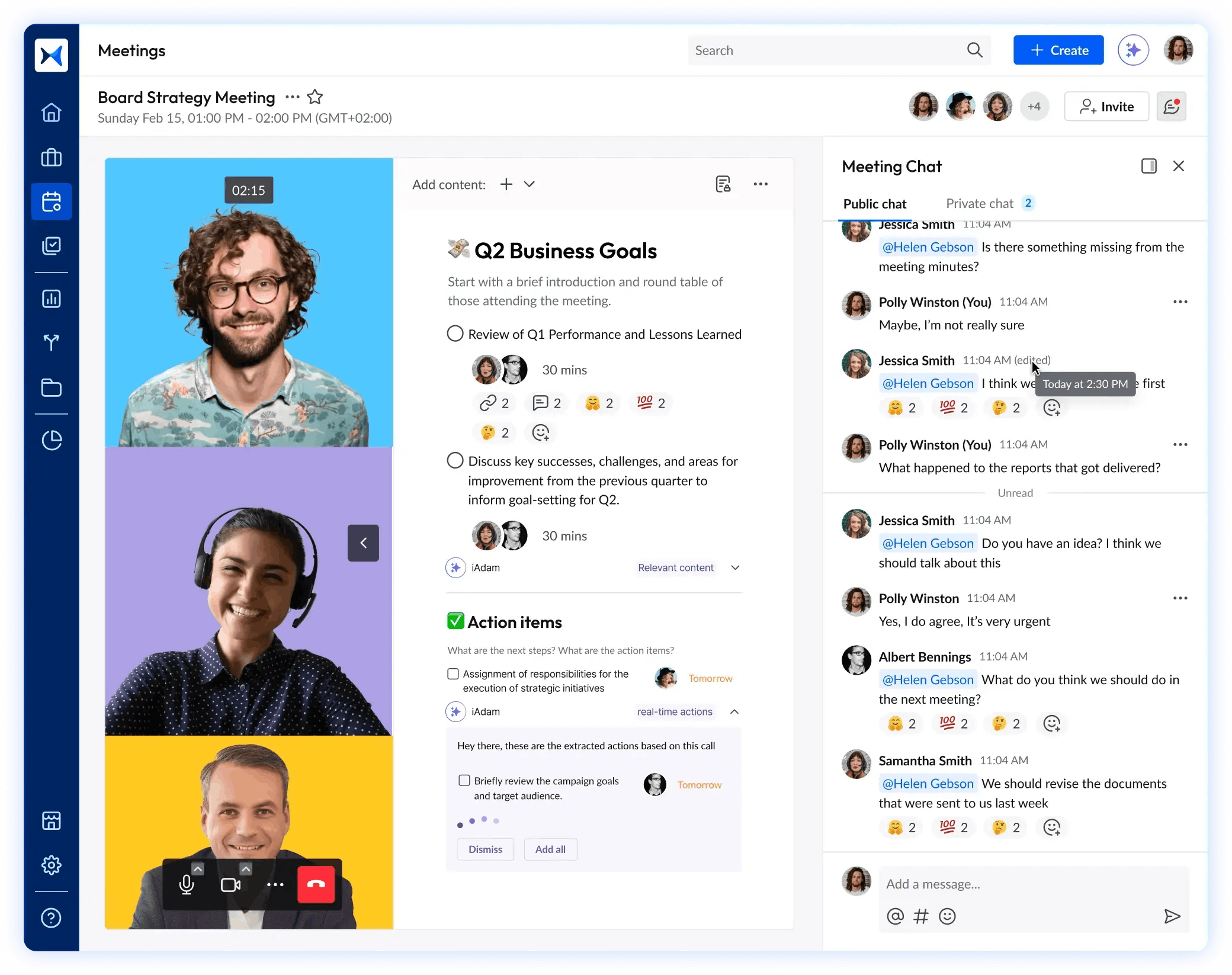
How adam.ai helps:
✔ Offers a centralized meeting space, so all project discussions and decisions are in one place.
✔ Supports real-time collaboration, ensuring all stakeholders have access to meeting insights.
✔ Provides multilingual AI transcription, making global research coordination easier.
4. Streamline compliance and documentation for research projects
From funding approvals to ethical reviews, research teams must keep thorough documentation of their decisions and processes. adam.ai automates meeting records, ensuring compliance with grant and institutional requirements.
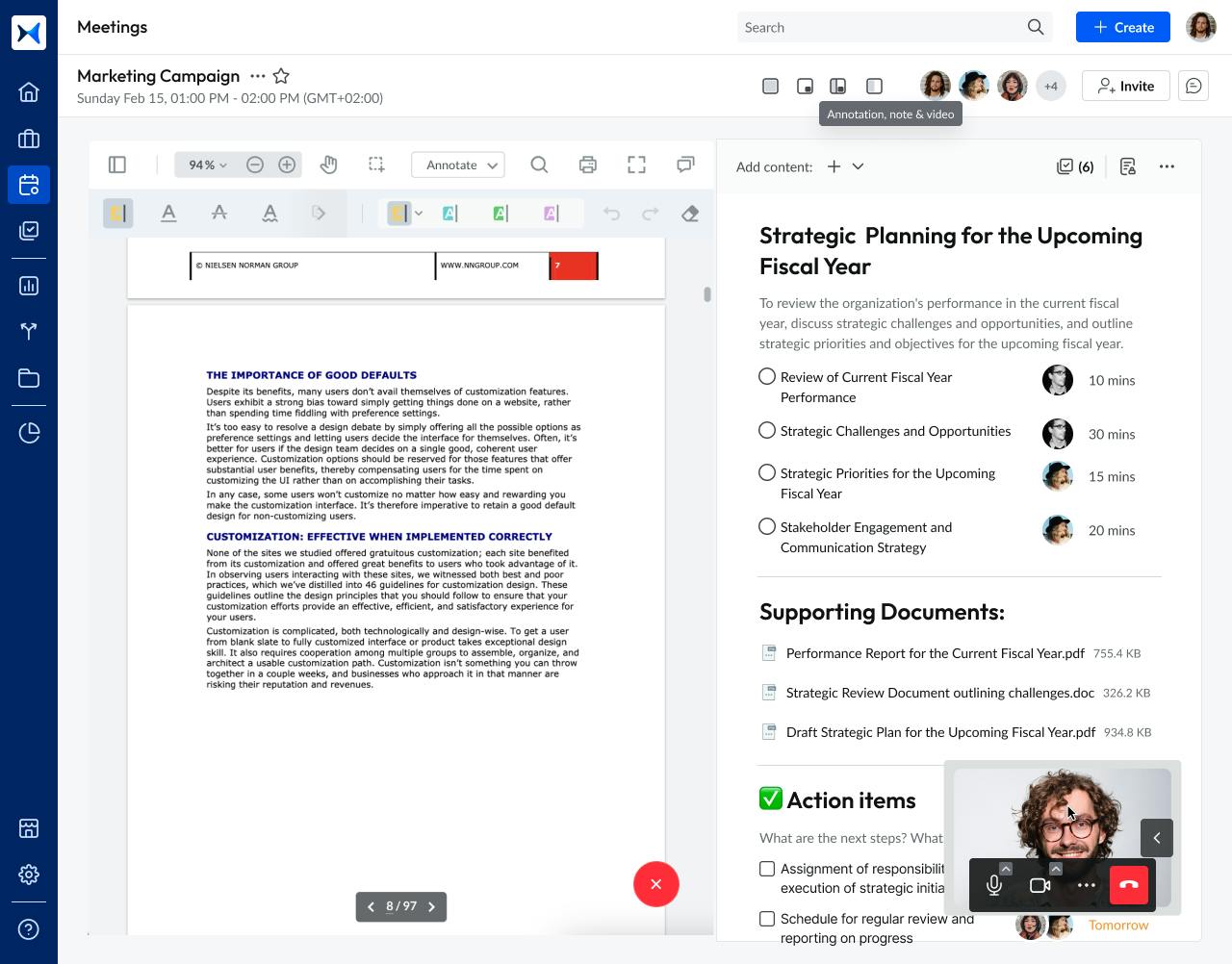
How adam.ai helps:
✔ Automatically logs meeting records, making compliance audits easier.
✔ Ensures version control of meeting notes, preventing loss of critical information.
✔ Provides a searchable knowledge base, so past decisions and discussions can be retrieved instantly.
Why research teams choose adam.ai for AI-driven meeting management
With its AI-powered approach, adam.ai transforms meetings from a time drain into a valuable research management tool. It enables teams to:
✅ Run structured, productive meetings with automated summaries and action tracking.
✅ Reduce meeting overload by automating follow-ups and reminders.
✅ Improve research collaboration by centralizing discussions, decisions, and documents.
✅ Ensure compliance and knowledge retention, keeping all research insights easily accessible.
Transform how you conduct critical meetings—From meticulous preparation to effective execution and insightful follow-up, adam.ai integrates comprehensive analytics, full customization, and intuitive interfaces with powerful meeting management tools.
Easy onboarding. Enterprise-grade security. 24/7 dedicated support.
The bottom line
Research teams don’t have time to sift through scattered notes or chase follow-ups. AI-powered meeting tools bring structure and accountability, making every discussion count. From capturing key insights to automating action tracking, these solutions keep projects moving without added administrative burden.
And while there may be multiple solutions available, here is why adam.ai is the meeting management software platform you can trust:
- adam.ai is one of Atlassian Ventures' portfolio companies.
- In the meeting management software category on G2, adam.ai has been ranked a leader and a high performer for successive quarters in the past years.
- adam.ai has been included in the Forrester Report in the AI-enabled meeting technology landscape.
- adam.ai is trusted and used by powerful teams and organizations worldwide for all types of critical meetings, like board, committee, project management, and business development meetings.
- And most importantly, adam.ai integrates with your existing workflow, is SOC2 compliant, provides dedicated support and success, and has a free trial option.
Subscribe to adam.ai blog
Stay ahead with the latest insights—get our newest blog posts, tips, and updates sent straight to your inbox.